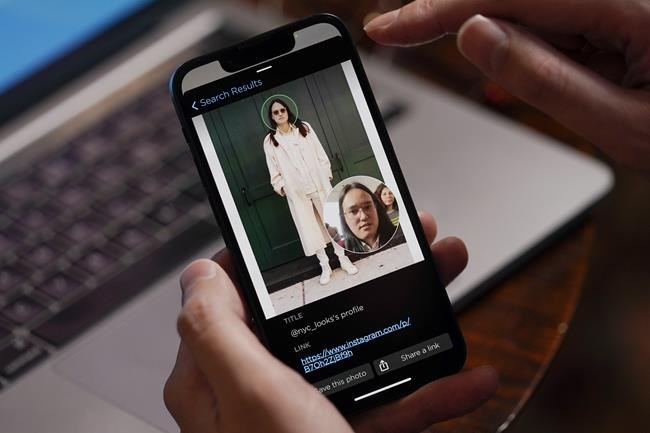OTTAWA — The federal government is asking a judge to dismiss a Quebec photographer's bid for certification of a class-action lawsuit, possibly involving millions of people, over the RCMP's use of a controversial facial-recognition tool.
In a submission to the Federal Court, government lawyers say Ha Vi Doan cannot allege that she suffered "harm of any kind" as a result of the national police force's dealings with U.S. firm Clearview AI.
Doan's proposed class-action lawsuit seeks unspecified damages for her and other Canadians whose photos and related information were allegedly part of a massive database compiled by Clearview AI and used under licence by the Mounties.
Clearview AI's technology has come under intense scrutiny because it entails collection of huge numbers of images from various sources with the aim of helping police forces, financial institutions and other clients identify individuals from photos.
In a February 2021 report, federal privacy commissioner Daniel Therrien and three provincial counterparts said the New York-based company's scraping of billions of images of people from across the internet was a clear violation of Canadians' privacy rights.
Last June, Therrien found the RCMP broke the law by using Clearview AI’s software to collect personal information.
The privacy commissioner found the RCMP had conducted 521 searches through paid and trial user accounts with Clearview from October 2019 to July 2020.
"In the absence of any evidence that the RCMP conducted these searches and seizures under lawful authority, the searches and seizures are presumptively unreasonable," Doan argues in a submission to the court.
Therrien concluded the RCMP had accessed images of Canadians from Clearview AI in the course of its work.
The Mounties have said publicly the force used the company's technology only in a limited way, primarily for identifying, locating and rescuing children who were victims of online sexual abuse.
However, the privacy commissioner's investigation found the RCMP did not satisfactorily account for the vast majority of the searches it made.
In the court filing, the federal lawyers say use of Clearview helped the RCMP identify and locate three child victims. Other uses included searching for a wanted fugitive and testing the application with either images of police officers, modified pictures of an American celebrity or media images of missing persons.
Clearview AI stopped offering its services in Canada on July 6, 2020.
Doan's proposed class proceeding says the RCMP became a Clearview AI client even though the company's services entailed a "large-scale invasion of privacy of residents and citizens of Canada,'' as well as infringement of copyright.
Doan is passionate about photography and takes pictures of herself and others, posting a significant number on her own website and online platforms such as Facebook and Instagram, the filing says.
She alleges her "personal biometric information'' and photos have been collected, copied, reproduced, stored or used by Clearview without her knowledge or consent.
The class action would cover people in Canada whose images are in the Clearview AI database and those holding copyright and moral rights with respect to photos.
It seeks a court order that the RCMP destroy all documents and information from Clearview in response to searches of the database involving residents of Canada.
In their filing, federal lawyers note Doan obtained confirmation from Clearview that as of July 10, 2020, the company had identified seven distinct images of her from the internet. These appear to be from her Instagram and Twitter accounts, her commercial website and two unrelated sources.
"Whether one speaks of Google, Facebook, Instagram, Clearview, or a telephone directory, access to any public database or search engine does not create liability with respect to every person whose information is contained therein regardless of whether or how or what information was actually accessed," the federal submission says.
Doan does not allege that the RCMP actually saw, let alone copied, even a single photograph of her or taken by her in Clearview, the government lawyers say.
"Her case is premised on the notion that this fact does not matter. It does matter. In the absence of any material fact that the defendant looked for, saw, or copied some information related to the plaintiff, it is illusory to speak of violations of her rights or of causation," the federal filing says.
"Indeed, the plaintiff has not (and could not) allege that she has suffered any harm of any kind."
This report by The Canadian Press was first published May 13, 2022.
Jim Bronskill, The Canadian Press




